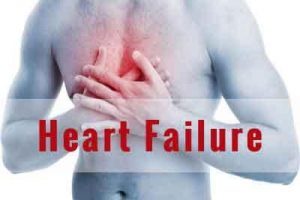- Home
- Editorial
- News
- Practice Guidelines
- Anesthesiology Guidelines
- Cancer Guidelines
- Cardiac Sciences Guidelines
- Critical Care Guidelines
- Dentistry Guidelines
- Dermatology Guidelines
- Diabetes and Endo Guidelines
- Diagnostics Guidelines
- ENT Guidelines
- Featured Practice Guidelines
- Gastroenterology Guidelines
- Geriatrics Guidelines
- Medicine Guidelines
- Nephrology Guidelines
- Neurosciences Guidelines
- Obs and Gynae Guidelines
- Ophthalmology Guidelines
- Orthopaedics Guidelines
- Paediatrics Guidelines
- Psychiatry Guidelines
- Pulmonology Guidelines
- Radiology Guidelines
- Surgery Guidelines
- Urology Guidelines
Centrifugal-flow pump superior to axial flow pump in heart failure patients

Dr.Mandeep R. Mehra, at Center for Advanced Heart Disease and medical director of the Heart & Vascular Center at Brigham and Women's Hospital, presented results from the MOMENTUM 3 trial's analysis at 24 months at the American College of Cardiology meeting. Brigham and Women's Hospital, BWH investigators report that patients who received the centrifugal-flow pump had significantly lower rates of pump-related blood clots and stroke.It infers that the new magnetically levitated centrifugal-flow device is superior to axial-flow left ventricular assist devices in complication-free survival, primarily due to the reduction in pump thrombosis.The results of the study have been published simultaneously online in the New England Journal of Medicine.
MOMENTUM 3 evaluated Abbott's HeartMate 3™ left ventricular assist system, a magnetically-levitated continuous centrifugal-flow circulatory pump, compared to the HeartMate II™. The trial evaluated how many participants, two years after receiving their device, had not suffered a disabling stroke or had an operation to replace or remove a malfunctioning device. A total of 366 patients were randomized to receive either the centrifugal flow pump or the axial flow pump. Researchers report that 151 of 190 patients on the centrifugal flow pump did not experience a disabling stroke or need a re-operation (79.5 percent) compared to 106 of 176 of the patients (60.2 percent) on the axial pump. Only three people who received the centrifugal-flow pump needed a re-operation compared to 30 who received the axial pump. No re-operations occurred due to blood clots in the centrifugal-flow pump. Deaths or disabling strokes were similar between the two groups, but overall, stroke rates were less frequent in the centrifugal-flow pump group. Bleeding and infection rates were no different between the two groups.
"This is a pivotal study in the field of advanced heart failure," said Mehra. "Left ventricular assist devices have been in development for 40 years and there have been improvements in their technology but several challenges exist, including problems of blood clots forming in these devices, requiring device replacement. The field has been trying to engineer devices that could obviate some or all of these problems, and we report today on some important advances."
MOMENTUM 3 launched in 2014 and was designed to dramatically reduce the overall timeline for clinical trials. All patients with refractory heart failure who needed a cardiac pump were eligible for the trial, regardless of whether the pump was intended as bridge to transplantation or destination therapy.
"Traditional trials must undergo safety testing, followed by testing in healthier populations, and it can be over a decade before the broader population has access to such therapies," said Mehra. "Removing restrictions based on transplant status resulted in a unique study that has been extremely successful in its enrollment and highly expeditious in delivering results."
The HeartMate 3 includes several technological adaptations intended to reduce risk of complications. The fully magnetically levitated device runs like a bullet train - its rotor has no mechanical bearings in it and pushes the blood using only magnetism. It is designed to reduce shear stress, which is thought to cause blood clots to form in pumps.
In its next phase, MOMENTUM 3 will evaluate 1,028 patients at the two-year mark to further validate the current findings. Results of the full cohort are expected by the end of 2019.

Disclaimer: This site is primarily intended for healthcare professionals. Any content/information on this website does not replace the advice of medical and/or health professionals and should not be construed as medical/diagnostic advice/endorsement or prescription. Use of this site is subject to our terms of use, privacy policy, advertisement policy. © 2020 Minerva Medical Treatment Pvt Ltd